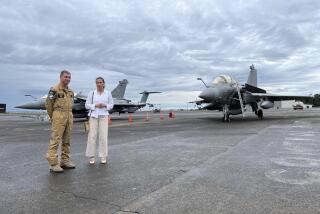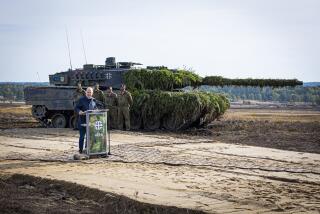ATLANTIC ALLIANCE : Luftwaffe Draws Flak in Its Turkey Excursion : But Germany’s deployment of fighters is more of a political gesture than a military threat.
- Share via
BERLIN — This week’s arrival of the German Luftwaffe in eastern Turkey to protect NATO’s southernmost member against possible attack from Iraq was welcomed by many in the West.
The Germans, long reluctant to send forces into the troubled Persian Gulf region, had finally moved by dispatching 18 Alpha Jets as part of a North Atlantic Treaty Organization force of 42 combat aircraft. An International Herald Tribune headline read: “German Military Gets Ready to Fight.”
But the type of planes, the government’s presentation of the action and the sharp domestic political backlash after the modest deployment point to another reading: The planes are more a political gesture than a military threat, and the Germans are unlikely to participate militarily in any gulf war.
Consider these factors:
Based about 240 miles northwest of the Turkish-Iraqi frontier near the city of Malatya, the Luftwaffe fighters, when fully loaded, have a combat range of only 150 miles, a fact that Chancellor Helmut Kohl’s government has stressed in selling the unpopular decision to an unsettled German public.
The jets are mainly anti-tank, anti-infantry aircraft deployed in a region where the Iraqis are believed to have few troops or tanks.
The German Parliament must consent before the Luftwaffe is committed to combat. Although the government rejects the opposition contention that a two-thirds majority is required, any decision to use the planes in combat would be a politically difficult action for Kohl.
“This is largely a political move,” said Don Kerr, an aviation specialist at the London-based International Institute for Strategic Studies. “It’s an expression of solidarity, not a substantial reinforcement of Turkish capabilities.”
Bonn officials say the planes probably are the end, not the beginning, of German military involvement in the gulf crisis. “Any deployment beyond Turkey to the gulf itself is absolutely ruled out constitutionally,” government spokesman Dieter Vogel said. “Only a massive attack on Turkey would bring a re-evaluation.”
Although ambiguously worded, Germany’s constitution has been interpreted by successive governments as forbidding the deployment of German military forces outside the NATO region.
Parliament is expected later this year to consider easing the constraints, possibly to allow use of German forces in non-NATO areas under controlled conditions. But the public mood is against any wholesale revision.
Some fear that if war comes and casualties are high, the lack of German military involvement, coupled with charges that German businessmen have helped Iraq in key areas such as chemical weapons, could bring serious tensions between Germany and Western allies in the anti-Iraq coalition.
For outsiders, the depth of resistance among many Germans to armed conflict is hard to understand.
The destruction that accompanied Germany’s last military adventure in World War II, followed by decades of Cold War tension, have left a recently reunited Germany with little appetite for armed confrontation.
In a recent poll, three-quarters of the 2,000 Germans questioned said Germany should avoid any international conflicts. Reaction to the Alpha Jet deployment reflects this mood. Peace demonstrations were planned for today in 26 German cities.
More to Read
Sign up for Essential California
The most important California stories and recommendations in your inbox every morning.
You may occasionally receive promotional content from the Los Angeles Times.













